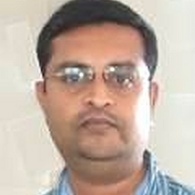Special Issue
Print Special Issue Flyer
Special Issue Editors
Special Issue Information
Keywords
Published Papers
Advances in Industrial Wastewater Treatment Technologies: Removal of Contaminants and Recovery of Resources & Life Cycle Assessment
A special issue of Journal of Applied Life Sciences and Environment (ALSE) (ISSN 2784-0360)
Timelines
The first submission date: 07-July-2024
The closing date for submission: 20-March-2025
Share
Special Issue Editors

Dr. Maulin Shah
Guest Editor
Industrial Wastewater Research Lab, Division of Applied & Environmental Microbiology, Enviro Technology Limited, Ankleshwar, Gujarat, India
Interests: Microbiology, Biotechnology, Environmental Engineering, Microbial Toxicology, Bio Medical Sciences, Environmental Sustainability, Biofuel, Bioenergy, Biomass, Green processes and technologies, Surface Catalysis, Biochemical Engineering, Industrial Wastewater Treatment, Activated Sludge Process, Anammox, Feammox, Bio Electrochemical Oxidation
E-mail: maulinshah1979@gmail.com
Special Issue Information
Today, it is becoming increasingly clear that industrial treated wastewater, whose reuse has become an important component of long-term water management worldwide, is a key source of chemical pollutants and biological emerging concerns. Current water quality guidelines for reclaimed waste water predominantly address the risks associated with the presence of microbial organisms and chemical parameters, such as the Biological Oxygen Demand, the Chemical Oxygen Demand, E. coli and worms, and in some cases heavy metals, which, however, are insufficient for the full evaluation of the risk. The global growth of the population is the urban growth and, therefore, the majority of the challenges and solutions related to the wastewater reside in the treatment plants. Unless wastewater management and wastewater governance processes are significantly improved in a decade, it is likely that wastewater treatment plant will face severe and prolonged water insecurity, urban floods and / or floods. Heat stress, which can lead to social instability and ultimately, mass migrations. The limits of resource availability change the current production systems of society and shift the focus from waste treatment, such as wastewater treatment, to resource recovery. Biotechnological processes offer an economical and versatile way of concentrating and transforming wastewater / wastewater into its reuse, which is a prerequisite for the technological development of a cradle-based economy. Current open challenges related to contaminant of emerging concerns include (i) their transformation when present in urban wastewater treatment plants and in environmental matrices (soil, groundwater, and surface water), and (ii) their soil accumulation. and uptake by plant components, (iii) their biological potency for environmental effects for non-target organisms, (iv) the evolution and dissemination of antibiotic resistance determinants, and (v) development and the application of sustainable technologies that can eliminate or minimize these micro contaminants in wastewater. The potential environmental and health effects of wastewater reuse on contaminant of emerging concerns are now a priority for several organizations.
This special issue aims to gather new research and review work from research and academic scientists, to identify the main barriers and limitations that will need to be overcome if wastewater reuse strategies are to gain more momentum and be adopted bigger and more efficiently. On a scale that is currently safe and sustainable.
Manuscripts dealing with the below topics are especially welcome, but are not limited to:
- Wastewater treatment technologies.
- Urban storm water management.
- On-site and decentralized wastewater treatment systems.
- Removal of trace organics and emerging contaminants.
- Membrane and disinfection technologies.
- Effluent disposal to waterways.
- Life Cycle Assessment for wastewater treatment
- Life Cycle Assessment of Emerging Technologies in Industrial Wastewater Treatment
- Life Cycle Assessment of Integrated bioelectrochemical-constructed wetland system.
- Life Cycle assessment of Microalgal Biorefinery
- Water reuse planning, policy, monitoring requirements, and standards/criteria.
- The role of water reuse for integrated water resources management.
- Wastewater treatment and reuse in future cities.
- Sewage bio solids management.
- Economic and social aspects of production and use of recycled water.
- Health and ecological risk analysis in water recycling applications.
- Emphasizes the role of nanotechnology in bioremediation of pollutants.
Manuscript Submission Information
Manuscripts should be prepared using the Template of ALSE and then sent online using ScholarOne Manuscripts.
Guidelines and relevant information for submission of manuscripts are available on the Instructions for Authors page.
To submit your manuscript, register and log in to the Submission website and then follow the seven steps required until the submission is complete. All authors should sign the Ethical Declarations of the Authors. Upload this declaration along with the manuscript.
After acceptance the papers will be published and listed together on the special issue website and as a current paper. Experimental research manuscripts are preferred but interesting reviews covering unpublished aspects will be also considered.
Download Paper Template
Download Patients Informed Consent
Download Compliance Questionnaire for Animal Research
Submit Manuscript
Further notes
- All submissions will undergo a peer/rigourous review process in which at least 2-3 experts will be invited to critically assess the work.
- All papers shall also undergo a strict similarity check (plagiarism) by journal.
The following criteria will be considered in selecting the papers as follow:
- Novelty.
- Advancement provided by the selected papers in relation to the existing knowledge of the nominated research areas.
Editorial process and peer review
- Author Submits
- Admin Checks and Passes to EIC
- EIC Assigns to Guest Editor
- Guest Editor Invites and/or Assigns Reviewers
- Reviewers Score
- Guest Editor makes recommendation
- EIC Makes Final Decision

